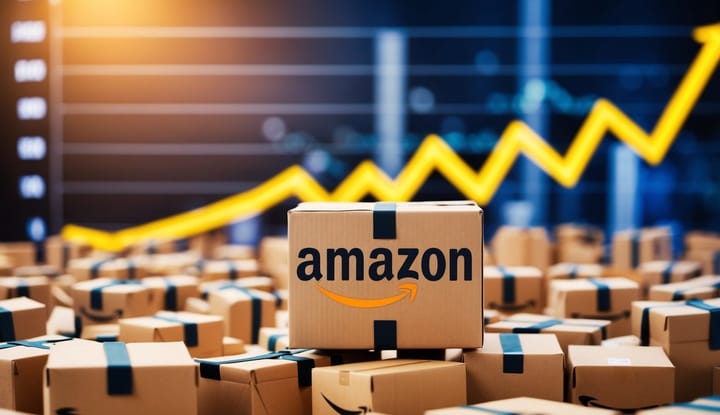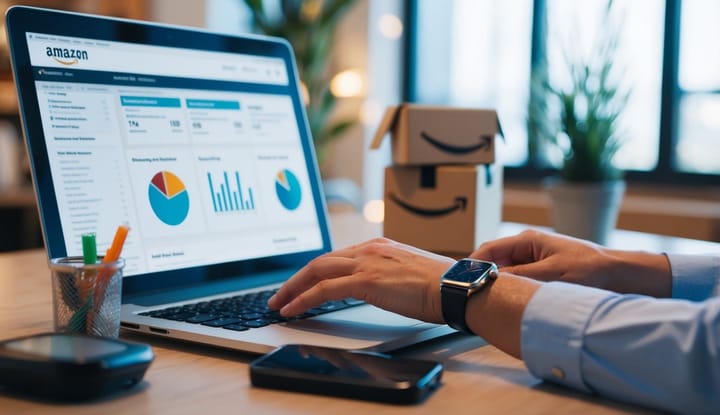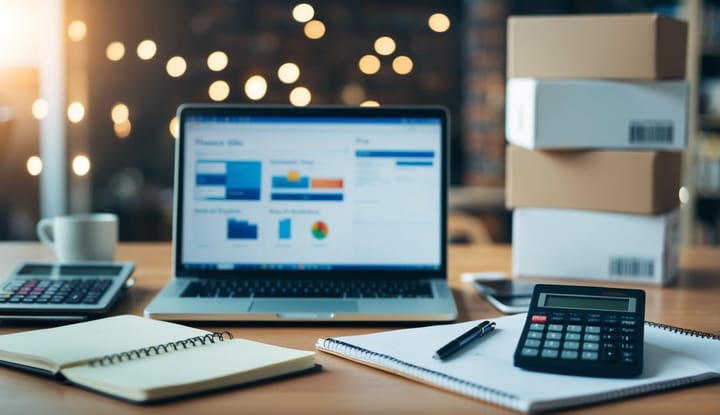How to Sell on Amazon FBA: Shipping from Alibaba to Amazon in 2024
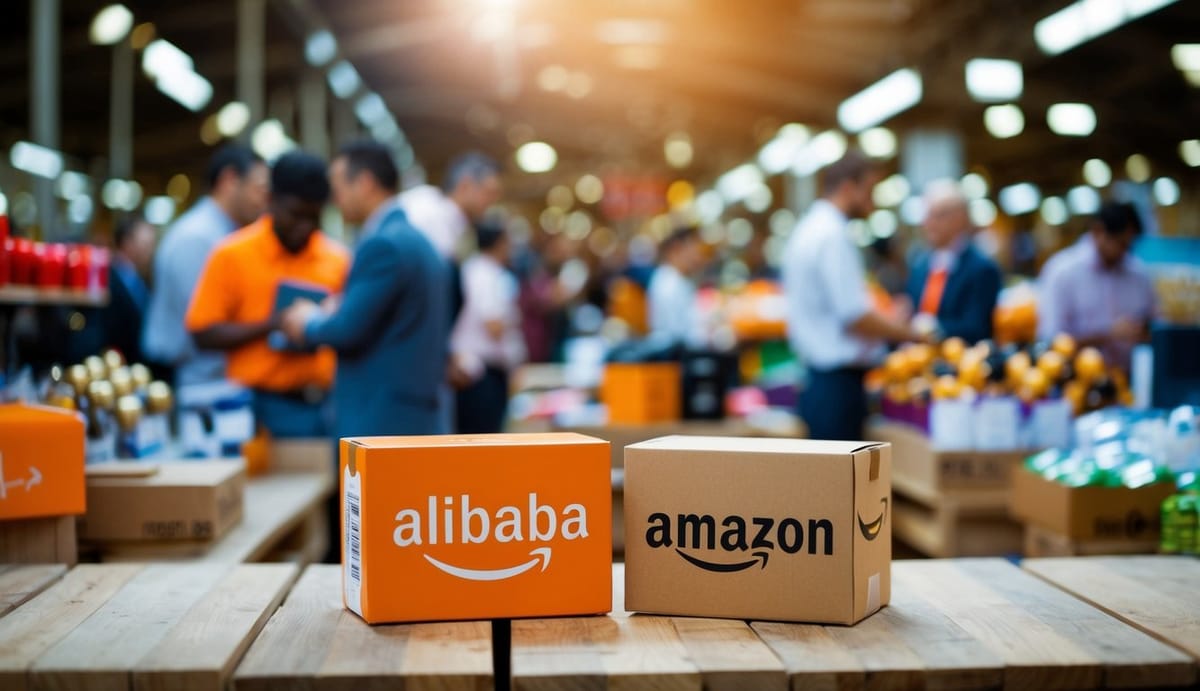
Are you ready to dive into the world of e-commerce? The path from Alibaba to Amazon FBA could be your ticket to success. This guide will show you how to find products on Alibaba and sell them on Amazon. It's a game-changer for online business.
Imagine getting millions of products at wholesale prices. Plus, Amazon handles storage, packaging, and shipping for you. This is the power of Alibaba to Amazon FBA. It's perfect for newbies and seasoned sellers alike.
We'll cover everything from setting up accounts to picking the right products. You'll learn about negotiating with suppliers and choosing reliable freight forwarders. By the end, you'll be ready to start your Amazon FBA business with Alibaba products.
Get ready to explore global e-commerce. Discover how to make Alibaba's vast selection profitable on Amazon. Let's start your journey to becoming a successful Amazon seller in 2024!
Key Takeaways
- Alibaba offers millions of products at wholesale prices
- Amazon FBA handles storage, packaging, and shipping for sellers
- Proper product research is crucial for success on Amazon
- Quality control and compliance are essential when sourcing from Alibaba
- Effective negotiation with suppliers can increase profit margins
- Understanding shipping logistics is key to smooth operations
- Alibaba's secure payment methods protect buyers and sellers
Understanding Alibaba and Amazon FBA
Selling on Amazon from Alibaba is a hit among e-commerce folks. It mixes Alibaba's wide product range with Amazon's smooth fulfillment. Let's dive into these platforms and their perks for sellers.
What is Alibaba?
Alibaba is a huge Chinese B2B site for bulk product sourcing. It's a treasure trove for Amazon sellers. When you ask for products, you might get replies from thousands of suppliers. It's smart to use a special email for Alibaba to keep things organized.
Introduction to Amazon FBA
Amazon FBA (Fulfillment by Amazon) takes care of storage, packaging, and shipping. It makes logistics easy, handles customer service, and deals with returns. About 64% of sellers use Amazon's logistics, making it key for many.
Benefits of sourcing from Alibaba for Amazon sellers
Buying from Alibaba to sell on Amazon has many pluses. You can find cheap items, explore a wide product range, and talk directly with makers. Alibaba's Trade Assurance adds safety to deals. With Amazon FBA, your business flow from start to finish gets smoother.
| Alibaba Sourcing | Amazon FBA |
|---|---|
| Low-cost bulk purchases | Efficient storage and shipping |
| Diverse product selection | Customer service management |
| Direct manufacturer contact | Returns processing |
| Trade Assurance protection | Prime eligibility for products |
Using both platforms can build a strong e-commerce model. Always check suppliers, talk terms, and check product quality. This way, you'll do great when shipping from Alibaba to Amazon.
Setting Up Your Accounts
To start your Amazon FBA business, you need to set up accounts on both platforms. This is key for selling on Amazon and using Alibaba for products. Let's go through the steps to create these accounts and connect them for smooth operations.
Creating an Alibaba Account
Alibaba, founded in 1999, connects over 10 million buyers with more than 200,000 suppliers worldwide. To create an account, visit Alibaba.com and click 'Join Free'. Fill in your details accurately and verify your account via email or phone. Alibaba offers Trade Assurance, protecting buyers against non-delivery or quality issues when they source products from Alibaba.
Establishing an Amazon Seller Central Account
Amazon FBA, introduced in 2006, is great for sellers storing products in Amazon's fulfillment centers. To set up your account, go to Amazon Services and choose between Individual or Professional seller accounts. The Professional account is best if you plan to sell more than 40 items per month. Provide your business details and set up payment methods.
Connecting Your Accounts
While there's no direct integration between Alibaba and Amazon, you can streamline operations by:
- Using the same email for both accounts
- Keeping product information consistent across platforms
- Utilizing inventory management software that supports both Alibaba and Amazon
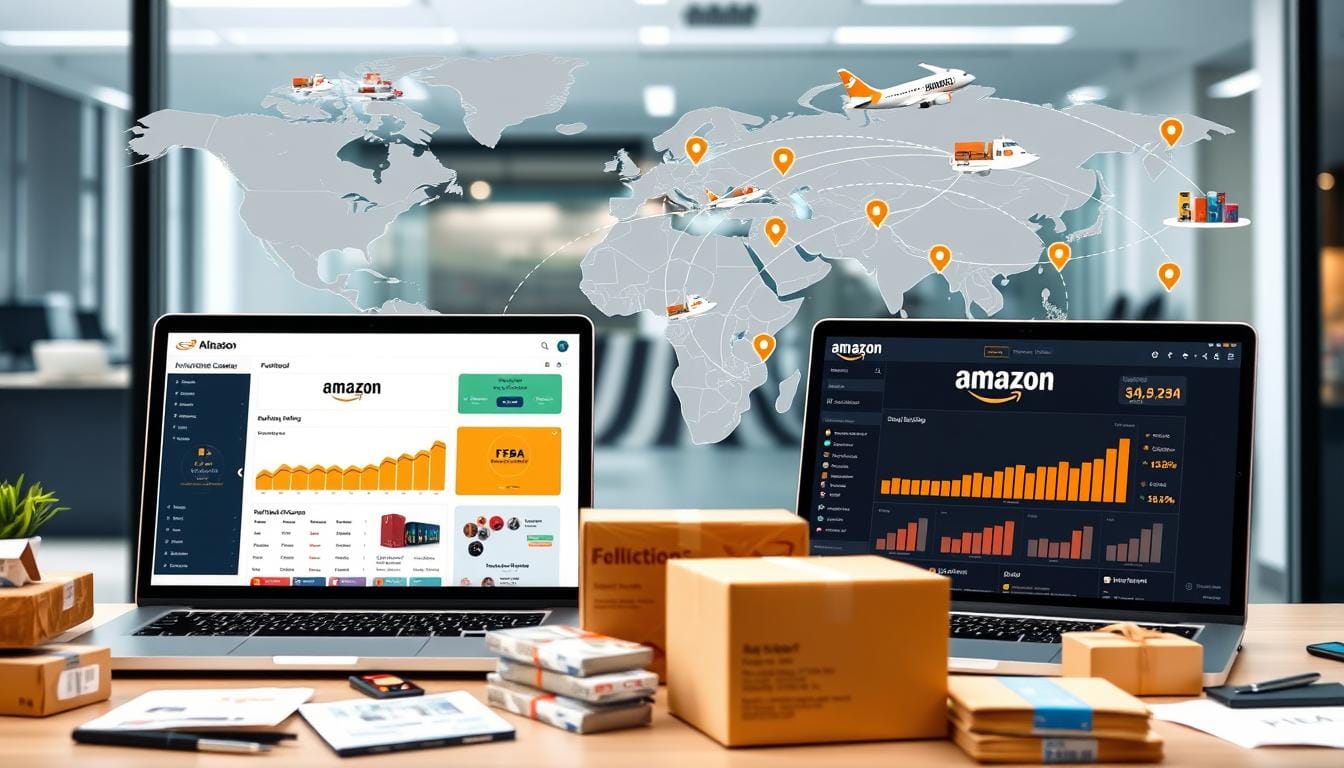
| Platform | Key Features | Benefits for FBA Business |
|---|---|---|
| Alibaba | 200 million+ products, 200,000+ suppliers | Vast selection, competitive pricing |
| Amazon FBA | Fulfillment services, 24/7 customer support | Simplified logistics, increased sales potential |
By setting up these accounts, you're ready to source products from Alibaba and sell on Amazon. This could help you make more profit in your FBA business. Remember to manage product labeling and quality control when bringing products from Alibaba to Amazon.
Product Research and Selection
Finding the right product for your Amazon FBA business is key. Start by exploring Alibaba's vast marketplace. It connects you with manufacturers and suppliers. Use Alibaba's search tools to find products that fit your goals.
When looking at products, consider a few important things:
- Market demand on Amazon
- Competition levels
- Seasonality
- Profit margin potential
- Product quality and compliance
Choose items with high demand and low competition for better success. Calculate your profit margin by considering product cost, shipping, Amazon fees, and other expenses. Aim for a good margin to make your investment worth it.
When finding products to sell on Amazon, look for suppliers with a Gold Supplier status and good customer feedback. This ensures quality and reliability. Shipping directly from Alibaba to Amazon FBA centers can also save you money and simplify your operations.
Use Amazon's analytics tools to understand sales trends and volume. This information helps you find products with great potential for your business.
| Consideration | Impact on Amazon FBA Business |
|---|---|
| Product Cost | Affects profit margin and pricing strategy |
| Shipping Costs | Influences total expenses and product competitiveness |
| Amazon Fees | Reduces profit margin, varies by product category |
| Competition | Affects sales potential and marketing strategy |
| Market Demand | Determines sales volume and product viability |
By carefully researching and choosing the right product, you'll lay a solid foundation for your Amazon FBA business. Success often comes from finding the right balance between profitability and market demand.
Alibaba to Amazon FBA: The Shipping Process
The journey from Alibaba to Amazon FBA starts with shipping. This guide will walk you through the steps of international trade. It ensures your products arrive at Amazon's warehouses safely and on time.
Negotiating with Suppliers
When choosing suppliers on Alibaba, look for quality manufacturers. They should have verified badges and positive reviews. Negotiate shipping terms like EXW, FOB, or CIF to save money. Alibaba has many suppliers, so take your time to find the best one for your business.
Choosing a Freight Forwarder
Finding a reliable freight forwarder is essential. Consider air freight, sea freight, and express courier services. For small shipments (100-200 Kgs), air freight is best. But, ocean freight is cheaper for bigger shipments.
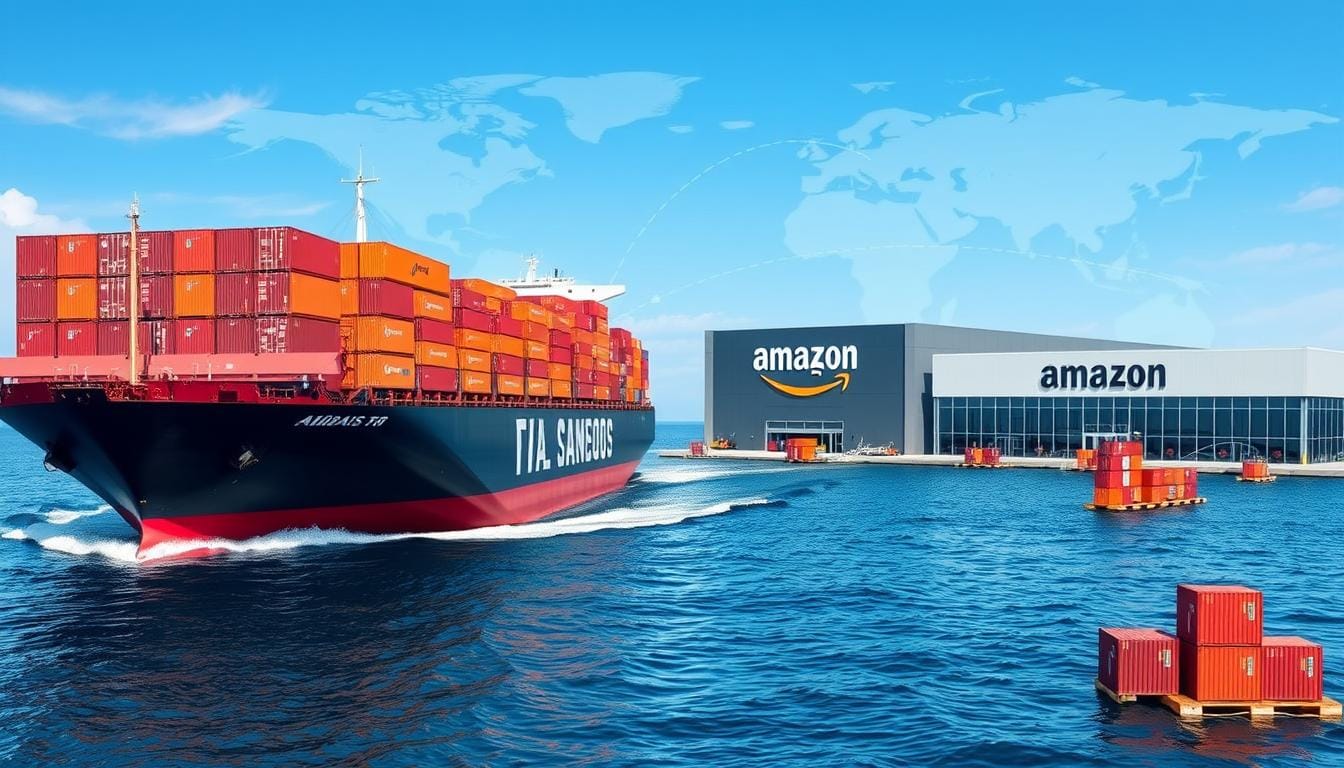
Preparing Your Products for FBA
Make sure your products meet Amazon's packaging standards. Include FNSKU/UPC barcodes on each item and FBA barcodes on cartons. For palletized shipments, add pallet labels. Quality checks are important - think about using third-party services to inspect your products before shipping.
Creating Shipment Plans in Seller Central
Use Amazon Seller Central to plan your shipment. This tool creates shipping labels and instructions. Share these with your supplier for correct transport to the port or airport. Keep an eye on your shipment and fix any problems quickly for a smooth process.
| Shipping Method | Estimated Time | Best For |
|---|---|---|
| Air Freight | 8-10 days | Small, urgent shipments |
| Ocean Freight | 30-40 days | Large, cost-effective shipments |
| Express Courier (DHL, FedEx) | 3-5 days | Very small, time-sensitive shipments |
Ensuring Product Quality and Compliance
When you source from Alibaba to sell on Amazon FBA, quality and compliance are crucial. It's important to check suppliers well to avoid bad products. Look for Gold Supplier status, Transaction Level, and customer feedback to find a reliable partner.
Getting product samples before big orders is key. It lets you check quality and make sure it meets Amazon's high standards. About 40% to 60% of sellers use on-site inspections or third-party services for extra checks.
Following Amazon's rules is a must when selling there. Stay away from fake or branded items to avoid account problems. Here's how to keep quality up:
- Thoroughly review supplier profiles and product listings
- Conduct keyword searches to find reputable suppliers
- Look for suppliers with several years of experience and positive feedback scores
- Check for relevant industry certifications
Alibaba provides quality checks in China for under $48 and $118. These services help make sure products are good before they go to Amazon FBA.
| Quality Control Measure | Impact |
|---|---|
| Third-party inspection | Reduces defect rate to 2-5% |
| Supplier verification | Increases reliability by 30-60% |
| Product samples | Ensures 90-95% accuracy in quality assessment |
By using these steps, sellers can lower quality risks and make shipping to Amazon FBA easier. Keeping products high-quality is essential for success on Amazon and building a good brand.
Conclusion: Maximizing Success in Your Amazon FBA Business
Selling on Amazon FBA with products from Alibaba is a big chance for entrepreneurs in Singapore. It's all about picking the right products, checking their quality, and shipping them well. Alibaba's huge supplier network helps sellers find good deals and send products straight to Amazon FBA warehouses.
To do well, you need a smart plan. Use Amazon's ads to make your products more visible. Work closely with reliable suppliers to keep your products top-notch. This will help you get good reviews, which are key to selling more and gaining customer trust.
Amazon FBA is more than just shipping. It opens the door to millions of Prime customers and global markets through Amazon's Global Selling Program. Keep up with Amazon's rules, manage your stock well, and stay current with trends. This way, you can succeed in the fast-paced world of online shopping. The path from China to Amazon FBA may be tough, but the benefits are worth it for those who do it right.
Frequently Asked Questions
Q: How can I sell on Amazon using products from Alibaba?
To sell on Amazon with Alibaba products, first find profitable items on Amazon. Then, find suppliers on Alibaba. Create your Amazon seller account and list your products. Use Amazon FBA for shipping.
Make sure to follow Amazon's rules and avoid selling fake goods. This way, you can sell products on Amazon using Alibaba's wholesale prices.
Q: What are the steps to ship from Alibaba to Amazon FBA warehouses?
To ship from Alibaba to Amazon FBA: 1) Talk to your Alibaba supplier about FBA-compliant packaging. 2) Get your products inspected. 3) Pick a shipping method, like air or sea freight.
4) Make a shipping plan in your Amazon Seller Central account. 5) Give your supplier Amazon's shipping labels and rules. 6) Track your shipment to Amazon's warehouse. This makes shipping for Amazon FBA sellers easier.
Q: How do I source products from Alibaba to sell on Amazon?
To source products from Alibaba for Amazon: 1) Look for trending products on Amazon. 2) Find these products on Alibaba.com. 3) Contact suppliers and ask for samples.4) Talk about prices, MOQs, and terms. 5) Check supplier credentials and product quality. 6) Order and inspect the products before shipping. 7) Make sure they meet Amazon's standards before shipping. This helps find reliable suppliers on Alibaba for your Amazon business.
Q: Can I ship directly from Alibaba to Amazon without seeing the product?
While shipping directly from Alibaba to Amazon without inspecting the product is possible, it's not advised. To ensure quality and meet Amazon's standards, order samples first. If you still want to ship directly, use a third-party inspection service.
This keeps your seller reputation safe and avoids Amazon issues.
Q: What are the risks of selling products from Alibaba on Amazon?
Selling Alibaba products on Amazon comes with risks. These include: 1) Getting low-quality or defective products. 2) Selling counterfeit goods, which can suspend your account. 3) Long shipping times affecting inventory.4) Communication challenges with suppliers. 5) Intellectual property issues. 6) Competition from other sellers. To avoid these, vet suppliers well, order samples, and stay updated on Amazon's policies.
Q: How do I use Alibaba to find private label products for Amazon FBA?
To find private label products on Alibaba for Amazon FBA: 1) Research niches and product ideas on Amazon. 2) Look for manufacturers on Alibaba who offer customization. 3) Request quotes and discuss MOQs. 4) Talk about branding options like custom packaging and logos. 5) Order samples and check quality. 6) Negotiate terms and place an order. 7) Arrange for quality control and shipping to Amazon's warehouses. This helps create unique products to sell on Amazon.
Q: What shipping method should I use for Alibaba to Amazon FBA?
The best shipping method from Alibaba to Amazon FBA depends on your needs. 1) Air freight is fast but expensive, great for small, high-value items or urgent restocks. 2) Sea freight is slower but cheaper for large shipments. 3) Express shipping (like DHL or FedEx) is quick but pricey, good for samples or small orders. Consider product size, weight, value, and urgency when choosing. Many sellers use a mix of methods based on their inventory and cash flow.
Q: How do I ensure the products I buy from Alibaba meet Amazon's quality standards?
To ensure Alibaba products meet Amazon's quality standards: 1) Research suppliers and check their certifications. 2) Order and inspect samples before buying in bulk. 3) Clearly tell your supplier about Amazon's requirements. 4) Use a third-party inspection service before shipping. 5) Consider visiting the factory if possible. 6) Start with small orders to test quality. 7) Review Amazon's specific requirements and ensure you meet them. This keeps your products high quality and avoids Amazon issues.
Ready to Launch Your Amazon FBA Business the Smart Way?
Join our mini-course at WAH Academy and get step-by-step guidance on finding your first product, setting up your seller account, and prepping for a successful launch—without the confusion.
No guesswork. No overwhelm. Just clear, practical help to get you started right.
Tap the button and take your first real step toward building your Amazon brand today.

